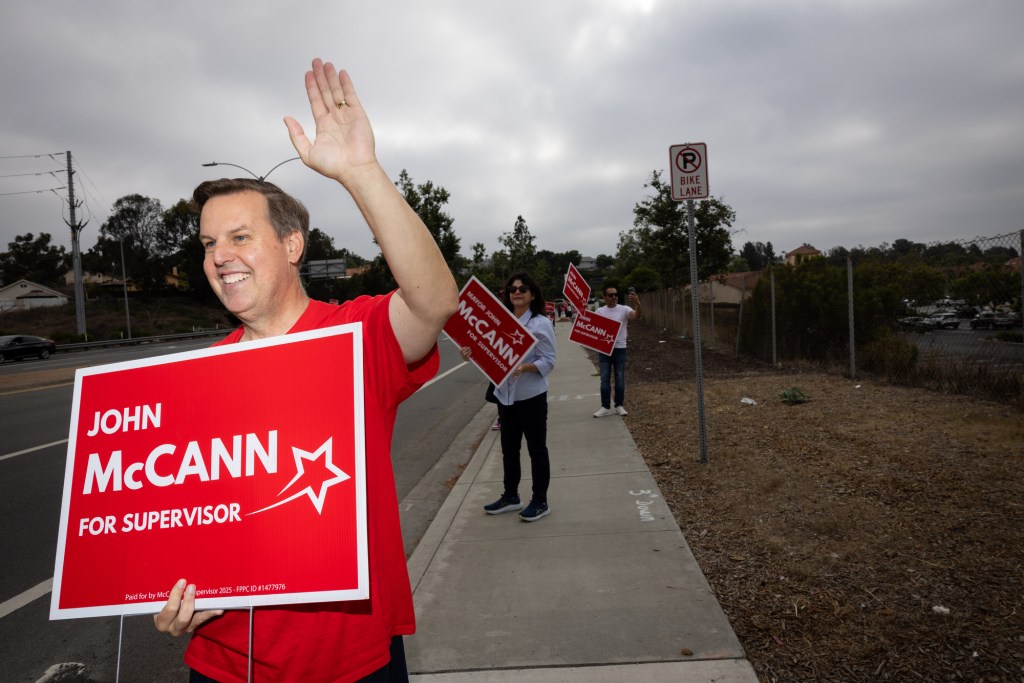John McCann and Kevin Faulconer have some distinct political similarities.
Both are Republicans and were elected mayor in cities where Democrats had a decided advantage in voter registration. They stressed a pro-business agenda and presented themselves as moderates.
And both lost recent races for county supervisor in which they were attacked relentlessly for their ties to President Donald Trump, among other things.
Lorie Zapf, also a Republican, wasn’t a mayor and had a more conservative profile than either McCann of Chula Vista or Faulconer, the former San Diego mayor. But she might have been the first notable local candidate whose political career was derailed in part because of Trump.
She lost her re-election bid for the San Diego City Council in 2018 after being pummeled by opponents for her support of Trump.
That history raises the question of whether Democratic candidates and their labor supporters will play the Trump card in at least three key local races next year for Congress, state Senate and another supervisor seat.
The answer is unsatisfying: It depends.
Trump may have been a constant in the McCann, Faulconer and Zapf losses, but as almost always is the case, many factors determined the outcomes.
The underlying political demographics were certainly important. Supervisor Terra Lawson-Remer won re-election against Faulconer in November in the heavily Democratic District 3. Imperial Beach Mayor Paloma Aguirre defeated McCann in Tuesday’s special election in District 1, which is also heavily Democratic, though the largely working-class and Latino district is viewed as more conservative.
Trump did better in those districts last year than in 2020, though he still lost big in both.
Meanwhile, voter registration in Zapf’s district had shifted more Democratic during her tenure on the council.
Faulconer and McCann also had unique ties to Trump that other local GOP candidates don’t.
In 2016, Faulconer said he “could never vote for Trump.” When gearing up to run for governor before the 2021 unsuccessful recall election of Gov. Gavin Newsom, Faulconer famously flipped and said he voted for Trump in 2020. A photo of Faulconer with Trump in the Oval Office was plastered on billboards, in mailers and all over social media by Lawson-Remer and her supporters.
McCann had to answer to Aguirre’s criticism about his letter to Trump appealing for clemency for a convicted fraudster — who then won early release from prison only to be convicted of fraud again.
Zapf didn’t have those kinds of connections, but her support for Trump apparently was enough for opponents to include him in mailers targeting her. Her stand on certain local matters and conservative positions on some social issues also were prominent in her loss to Jennifer Campbell.
The potential impacts on San Diego of Trump’s policies cutting health care funding, ramping up immigration raids and levying tariffs didn’t crowd out other local issues in Tuesday’s election, but they were a large part of Aguirre’s campaign.
Republicans have raised potent issues by questioning budget deficits, persistent homelessness, high housing costs and gas taxes under Democratic leadership locally and in Sacramento. But they’re increasingly being forced to answer for actions by Trump and the compliant Republican majorities in Congress.
Democratic and labor political strategists will be studying the conditions next year in specific races to determine how much they’ll focus on Trump.
Unlike the supervisorial Districts 1 and 3, the key races are in districts that do not have nearly as much, if any, Democratic registration advantage, suggesting a tougher call to go big on Trump attacks.
The 40th state Senate District is being vacated by Minority Leader Brian Jones, R-Santee, because of term limits. San Marcos City Councilmember Ed Musgrove and former Assembly candidate Kristie Bruce-Lane, both Republicans, are running, as is San Diego City Councilmember Marni von Wilpert, the only major Democrat in the race so far.
The district includes portions of North County and East County and part of the city of San Diego. Democratic and Republican registration is nearly equal, with a large portion of voters declining to state a party preference.
Kamala Harris carried the district by nearly 4 points over Trump last year, though that was just over half the victory margin of President Joe Biden in 2020.
Republican Supervisor Jim Desmond also is termed out of his North County District 5, where he was re-elected in a landslide in 2022, even though the district has been trending Democratic. Harris beat Trump there by more than 13,800 votes. As it happens, that’s about the same size as the Democratic voter registration advantage over Republicans in the district.
So far, two Republicans have announced they are running: Vista Mayor John Franklin and San Marcos Mayor Rebecca Jones. Kyle Krahel-Frolander, who is stepping aside as the county Democratic Party chair, has been weighing a candidacy.
Desmond, a former San Marcos mayor, is running for Congress against Democratic incumbent Mike Levin in the 49th District, which straddles the San Diego-Orange County line. He’ll face an uphill battle and there’s little doubt Levin will attempt to make Desmond account for Trump policies Levin believes are detrimental.
In each of his four elections — all of which have been competitive — Levin has used Trump to his benefit in the purple district, where Democrats hold a slight registration edge. The district rejected Trump three times.
Desmond, who appeared to be a moderate, pro-business mayor, has leaned more to the right as supervisor, largely supporting Trump on such issues as immigration and COVID policies.
Much was made of Trump’s improved showing in California last year, when he flipped 10 counties that went for Biden in 2020. Further, Republicans gained three seats in the Legislature.
But Trump still only received about 38 percent of the vote, losing to Harris by more than 20 points. Meanwhile, Republicans lost three California U.S. House seats.
That left the GOP with a thin majority and 2026 is an off-year election, when the party in control of the White House tends to struggle in congressional races.
